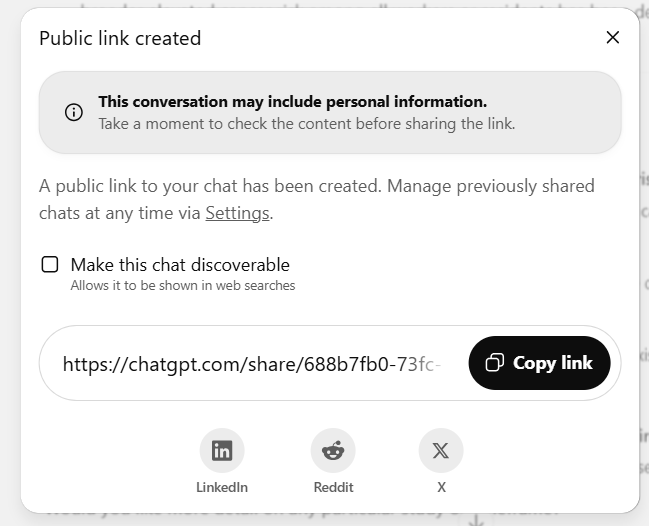What Happened?
Google recently started indexing publicly shared ChatGPT chats—those shared through special URLs generated by users. These shared chats included everything from casual prompts to highly sensitive business or personal information.
The key point? If users enabled discoverability, their chats could be found through a Google search.
⚠️ Why It’s a Big Deal
Thousands of these shared conversations started appearing in Google search results. Some included:
- Job applications and resumes
- Personal mental health discussions
- Internal company strategies
- Client conversations and sensitive business ideas
Even though the feature was opt-in, many users weren’t aware their shared content would be searchable.
🚨 What OpenAI Did Next
After the issue was highlighted, OpenAI quickly took the following steps:
- Removed the “make searchable” option from the sharing feature
- Began the process of removing indexed links from search engines
- Clarified that shared links were never public unless users opted in
They acknowledged that even anonymized data can pose a privacy risk when searchable on the web.
✅ What You Should Do Now
If you’ve ever shared a ChatGPT conversation using a public link, follow these steps:
- Search your content using a Google query like:
site:chat.openai.com/share [your name/topic] - Go to your ChatGPT account and check the Shared Links section
- Delete or make private any links you don’t want searchable
- Avoid including sensitive data in shared chats in the future
🧠 Why It Matters
This situation highlights a growing challenge in the AI era: balancing useful features with privacy and control. As AI becomes more integrated into work and personal life, it’s crucial that users:
- Understand how sharing tools work
- Are informed of potential exposure risks
- Know how to manage what’s made public
💬 Final Thoughts
This was a clear reminder: Even tools designed for ease and openness can backfire without the right privacy guardrails. Moving forward, anyone using AI tools should treat shared content with the same care as emails or official documents.








